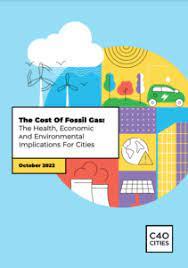
https://www.c40.org/news/cost-of-fossil-gas-health-economic-environmenta...
It consists largely of methane, an especially potent greenhouse gas (GHG). When burned for energy, fossil gas produces significant air pollution and carbon dioxide (CO2) emissions as well as harmful social, economic and environmental impacts. It accounts for around a quarter of global energy supply and a fifth of CO2 emissions from energy. Urban energy use is driving up demand.
This research assesses the climate, air quality and health impact of fossil gas use in the 96 C40 member cities, to inform actions taken by cities with regard to gas. It looks at fossil gas use across electricity, buildings (heating and cooking) and industry.
The cost of fossil gas finds that city decision-makers should seek to shrink the role of gas in the energy mix because:
- Fossil gas use results in air pollution and negative health outcomes. Fossil gas contributed to premature deaths almost as much as coal in C40 cities in 2020 – Jakarta and New York City recorded the highest figures in this research, at 4228 and 2882 respectively. By contrast, a swift, clean energy transition away from fossil gas is estimated to avoid as many as 217,045 premature deaths in C40 cities by 2035 (cumulatively), and 776,190 premature deaths by 2050.
- The economic arguments for fossil gas do not stack up. New renewable capacity already costs less than new gas capacity where all but one of the 96 cities included in this study are located. Renewables are on course to be cheaper than fossil gas everywhere within the next few years.
- Methane leaks can negate the climate benefit relative to coal. Because methane is such a potent GHG, the climate advantage of fossil gas over coal becomes marginal if as little as 3.2%–3.4% escapes into the atmosphere before being burned. Methane leaks can be substantial – studies have found leakage rates of up to 17%, and rates are estimated to average 3.3% to 4.7% in cities.
- Cities are central to curbing gas use. Urban households, businesses and governments are key energy consumers, meaning that cities can have an impact across the fossil gas supply chain. Urban fossil gas use varies significantly across regions – rates are highest in Europe and North America, where C40 cities’ fossil gas use accounts for 40% and 23% of total regional gas consumption respectively. Overall, local and upstream fossil gas use account for 9% of all GHG emissions in C40 cities, on average, of which 40% are from electricity generation, 39% are from building-scale use (primarily for heating and cooking), and 13% are from industry. By banning and reducing demand for fossil gas, and increasing renewables, cities can lead the way for a swift transition from fossil gas to clean energy globally.
- ABOUT
C40 is a global network of nearly 100 mayors of the world’s leading cities that are united in action to confront the climate crisis.
Mayors of C40 cities are committed to using an inclusive, science-based and collaborative approach to cut their fair share of emissions in half by 2030, help the world limit global heating to 1.5°C, and build healthy, equitable and resilient communities. C40 supports mayors to do this by:
- Raising climate ambition through 1.5°C climate action plan support, high-impact accelerators and fostering innovation.
- Building equitable and thriving communities via global and regional programmes.
- Building a global movement through robust international advocacy and diplomacy.
- Scaling up climate action and sharing best practices across high-impact sectors.
- Facilitating access to finance for investment in green jobs and projects that improve resilience in cities.









